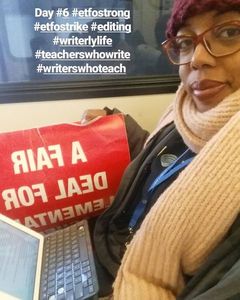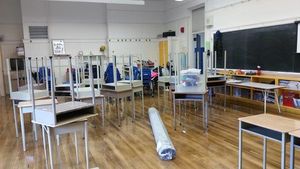Blogpost #7: DOES WRITING KID’S BOOKS MAKE CENT$? Part 2 Financing your Writing
Since 2015, I have been a published author of books for young people and present my stories to hundreds of children each year. Some of the most common questions I am asked by this audience are “Why do you write stories? Where do your stories come from? Is Malaika real?” The bold middle graders will ask outright what everyone wants to know, “How much money do you make from writing? Can you live off of what you make?” (And yes, I have been asked this by children.) As my readers get older, read adult, I tend to get one of two questions, “How did you get into writing children’s books? [because I have always wanted to write one too]” and “How do you manage to be a full-time teacher and writer?” Or some variation of thsee questions. In other words: “Does writing kid’s books make cents?”
The Writers’ Union of Canada survey released the result of its study in 2018 which show that the average Canadian writer earns $9, 380 annually, basically about 4 months rent in Toronto.
I remembered something that author Andre Alexis said after he had won both the $25, 000 Rogers’ Writers Trust Prize and $100, 000 Scotiabank Giller Prize in 2015 for Fifteen Dogs. In a Quill & Quire interview, a mid-50-year old Andre Alexis was behind on his taxes, discovered that he earned about $5000 the year before his win. Not $50, 000 but $5000! This is far from a liveable wage. If this is any indication of the dire financial challenges of “a successful Canadian” author which Alexis is considered, I don’t know what is. Few people could afford to stay in a profession that pays them so little.
Just yesterday, I saw this online article aptly entitled: A DIRTY SECRET: You Can Only Be A Writer If You Can Afford It which shares comparable figures in the United States. The title alone is an affirmation which may be part of why I had a very long winding path to becoming a career writer as my second career. It may explain why even though I was making books at age 6, started my first novel at 11, wrote for my high school newspaper, and even completed a NYC magazine internship at age 20, the idea of becoming a writer professionally and being paid for said endeavour never entered my thoughts. Like many children of immigrants, I was ushered to practical careers and my case it was nursing. This very well could have been my fate along with the other paths I considered— psychologist, doctor, social worker, but I chose one— teacher. I have been teaching for almost eighteen years.
I know writers who are able to keep writing based on the different levels of support from loved ones. One who made less than Alexis one year but lived rent-free as a tenant in one of his parents rental apartments. Some are blessed to have spouses who said “you can leave that daytime job/career, so you can just focus on your writing”. I feel I have some flexibility as a single author with a full-time career currently who pays low-cost rent. Presently, my health is good, I don’t have children, and I have been blessed with a few arts grants. But, it is often challenging to balance it all. There is no how-to manual. Although the book called Writer With A Day Job is one helpful book I found in 2011, early on in my professional writing pursuit. Still, I often feel like a unicorn in this endeavour. There are not many of us and we are not talking about it enough. I try to find out from other teacher-writers if I can find them to see how they manage it all. However, with some investigation, I am happy to know that I am not alone in doing double duty. A number of authors are teachers, lawyers, professors, and counsellors because it is the only way they can keep writing. Others like their careers and have not wanted to leave them so they somehow manage the juggling act. Late Russian playwright and short story writer Anton Chekhov was a physician and so are Khaled Hosseini, Nadia Hashimi, I.W. Gregorio, and Canadian authors Vincent Lam presently and Adwoa Badoe previously. Like me, there are many Canadian authors who teach like Caroline Pignat, Amy Stuart, and Uzma Jalaluddin. Others like Eric Walters, Sajidah (SK) Ali, Humble the Poet, Danielle Daniel, Rina Singh, and many others who were school teachers but now pursue writing full-time.
When I decided to write this blog post, I set out to find out how do my Canadian writing peers afford their careers. I posted the following questions on my social media (Facebook, Instagram, Twitter):
For my next post, authors: 1) Why do you write #kidlit and/or #yalit? 2) How do you afford to write? Anonymity upon request. Dm.
I did not receive any responses and that did not shock me. But, I do empathize. I don’t think writers like to talk about this topic or disclose such personal information. May we be shy to say that you need more than just talent and hard work? Although not absolutely necessary for success, finances are helpful.
Now that we establish having a second career is a necessity for many writers to survive financially, you are probably wondering how I do it. How do I maintain a full-time career as an elementary teacher and an author especially given the increasing workloads of Ontario educators? (I am still trying to figure this one out myself. Sometimes, I even ask myself, how did I do it?) I don’t have all of the answers and although this hustle is not easy but it is doable. This is what I’ve learned so far:
1. Juggle like your life depends on it. And don’t drop a ball. And definitely do not drop the balls at the same time.
Your CanLit News
Subscribe to Open Book’s newsletter to get local book events, literary content, writing tips, and more in your inbox
2. Let your career/day job be your benefactor.— Lisa Nicholls, motivational speaker, entrepreneur
3. “Medicine is my lawful wife, and literature is my mistress. When I get fed up with one, I spend the night with the other. Though it is irregular, it is less boring this way, and besides, neither of them loses anything through my infidelity.”— Anton Chekhov, physician, playwright
I’m not endorsing having affairs nor this slightly chauvinistic analogy. But, I sort of see what Chekhov was getting at. Sort of.
4. Sometimes you need to lose sleep… burn the midnight oil… burn the candle at both ends... especially if you have writing deadlines, interviews, a conference to present, a book signing on the weekend, and its report card writing season... but you will get sleep... eventually. I promise.
5. Take one positive step forward at a time while staying consistent. One page edited today is one more page edited than yesterday. Two emails responded to today are two more emails than yesterday.
6. Self-care. Stay as healthy as possible so you can keep up with your demanding schedule. Talk to friends and family. Schedule breaks. Exercise. Pray. Meditate. Journal.
7. Shamelessly (and quietly) self-promote as much as your job allows you to. If you work in the school system or libraries, you may be a bit limited in how much you can share your writing, present, or discuss with your colleagues. However, loopholes may exist and always ask so you do not jeopardize one career for the other. For example, I can do author visits in my school board on days when I am not teaching in my board. I do not sell books to my colleagues but schools can purchase my book through the distributor along with the thousands of other book titles available. Invite your colleagues to your book events. Some of my former teaching colleagues are my biggest advocates and promoters over the years.
8. Try to improve every interaction with others. You are your own customer relations and you may only have one chance to meet someone. You never know how one interaction in your day job may translate into your writing career.
9. Mine your day job for story ideas. As a teacher, I am immersed in youth culture and I pick up on things that I can use in my stories. A few days ago, there was a fight in my classroom. As I interviewed the students and witnesses involved, it got me to rethink some of the dialogue and issues in my middle grade novel.
10. Don’t breakdown. If it become too much, don’t be afraid to take a break from one so you could focus on the other. Or even do one part-time for a while. Or take a break from everything altogether. The work will be waiting for you until you return.
11. Find the connections. When I went to the National Council for Teachers of English (NCTE) Conference in Baltimore in November 2019, it was the first time in my double career that I could be both fully a writer and a teacher. Being both a writer and teacher was a huge advantage. I presented my recent book #ALikkleMissLou: How Jamaican Poet Louise Bennett Coverley Found Her Voice at a local library, did a book signing/giveaway which got me chatting with many teachers, hosted a table at the children’s literature awards, facilitated a workshop on Black Girl literacies, met many of my favourite authors, and attended or organized socials for writers.
12. Use your breaks to get work done. Whether using your lunch break to finish that blogpost or grant application (done), your spring break to conduct research (done), or a vacation to research the setting of your next book (done), use these times strategically.
The views expressed in the Writer-in-Residence blogs are those held by the authors and do not necessarily reflect the views of Open Book.





